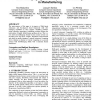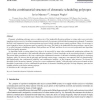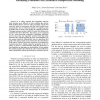316 search results - page 33 / 64 » Oblivious interference scheduling |
102
Voted
TSP
2012
13 years 8 months ago
2012
—Base station (BS) coordination is a key technique to handle intercell interference (ICI) in cellular networks. Nevertheless, recent work on scheduling indicates that the value o...
134
Voted
GECCO
2008
Springer
15 years 1 months ago
2008
Springer
The main purpose of this paper is to propose a Multi-Agent Autonomic and Bio-Inspired based framework with selfmanaging capabilities to solve complex scheduling problems using coo...
121
click to vote
DAM
2006
15 years 16 days ago
2006
Chromatic scheduling polytopes arise as solution sets of the bandwidth allocation problem in certain radio access networks, supplyingwirelessaccesstovoice/datacommunicationnetwork...
112
Voted
VTC
2010
IEEE
14 years 11 months ago
2010
IEEE
—This paper exploits the use of location information of wireless terminals to improve the performance of a beamforming system and support multiple access. Based on a system provi...
133
Voted
RTAS
2011
IEEE
14 years 3 months ago
2011
IEEE
—It is widely assumed that scheduling real-time tasks becomes more difficult as their deadlines get shorter. With deadlines shorter, however, tasks potentially compete less with...



